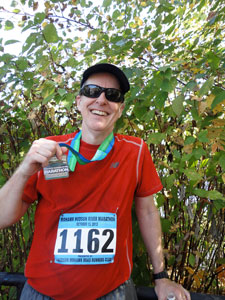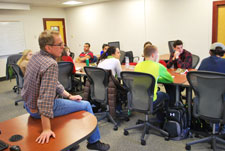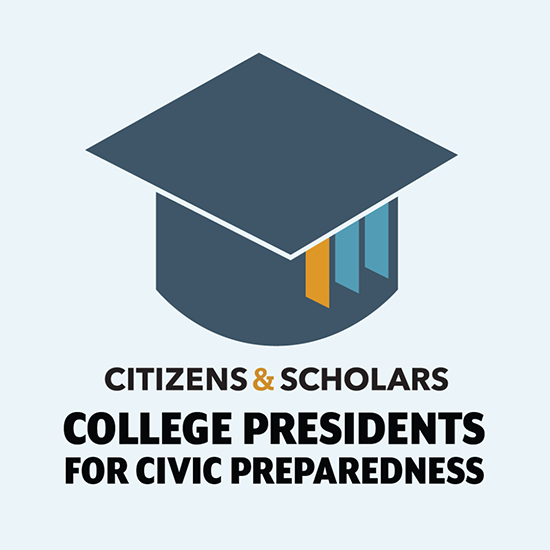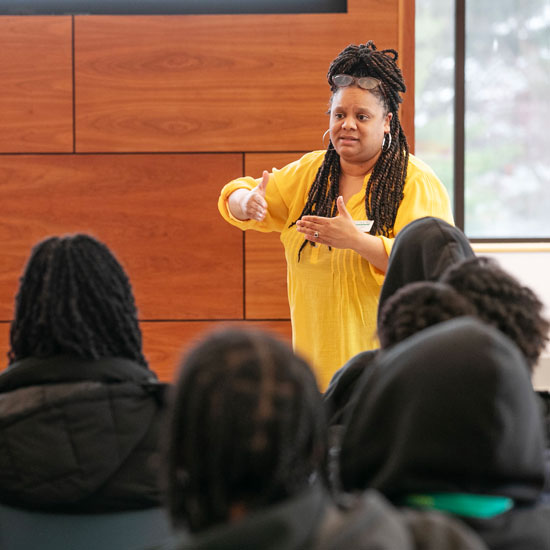Running across disciplines: Inside one first-year seminar

Rik Scarce on the run
“This class is adverb-crazy,” says slightly irked Rik Scarce just before returning an essay assignment. “Let the verb carry the day. Adverbs don’t add to; they detract from. And another thing: if I write ‘awkwardness’ in the margin, it means the sentence doesn’t make sense. That’s pretty major.”
“Are you taking notes?” he asks a late arrival. “It’s probably a good idea.”
“With regard to your papers,” the sociology professor continues, “some of you will be pleased, some frustrated. Grades that are not what you’d hoped for are kind of like running injuries—a metaphor.”
It was beginning to sound like academic boot camp. Grammar. Grades. Note-taking. Metaphors. Wasn’t this course about running?
Turns out this first-year Scribner Seminar, “Endurance: Long-Distance Running Across the Disciplines,” is definitely “not a how-to running class,” explains Scarce, who this fall ran the Mohawk Hudson River Marathon, his first. “It’s much more about using running in books, articles, and films as a delivery device to teach about skills students need to succeed at Skidmore. That’s the ultimate objective.”
One foundational skill is making sense of and integrating multiple information sources—the “comparative thing,” as the professor calls it. “I was particularly pleased,” he tells his first-year charges, “with those of you who wove together Professor Fehling’s science perspective with the movie Spirit of the Marathon and the books Born to Run and Running with the Buffaloes.” (syllabus)
On to the discussion phase, another requisite skill. “In Born to Run,” offers Emily Savarese ’17, “the Tarahumara Indians run to relieve stress, for the joy of it. In Buffaloes, the cross-country team runs to perform, to win, which stresses the body. When your body is stressed, it’s more likely to get injured.” Matt Bristol ’17 adds, “If I’ve learned one thing in college, it’s that your attitude is the source of your happiness.”

Scarce in class
Ever the sociologist, Scarce mines for more meaning. “What was Goucher’s primary motivation?” he asks in reference to Olympic hopeful Adam Goucher, who had been expected to carry the Colorado men’s cross-country team to an NCAA title in its adversity-filled 1998 season. “Why are you in college?” he asks rhetorically. “Perhaps because, just like Goucher, some day you will have to eat, put a roof over your head, and put clothing on your back. At base is the economic and political system—this ugly reality. It’s not that love, happiness, and fulfillment don’t exist. It’s just that they may not be primary.”
Before long, the class has touched on everything from Maslow’s hierarchy to the minimum wage in Bangladesh (about $60 a month) to class, race, and white privilege to their futures. Underneath it all loomed a few essential questions: What do I really know? Who am I? Why am I at Skidmore?
“I told you this course is like a Seinfeld episode—it’s about nothing, in a sense,” says Scarce during another classroom session. “It’s not like my social theory class. It’s not even Sociology 101. The whole purpose is you getting the liberal arts, the importance of speaking, working together, writing well, thinking critically, amassing evidence, and so on and so forth.”
On this particular morning, in their Scribner Library classroom, they discuss the iconic English novelette The Loneliness of the Long-Distance Runner. They plan to watch the movie version in the evening, which inevitably leads to a question about snacks. “I’m expecting a fully cooked turkey,” says one of the class wise guys, Reuben Graff ’17. “Can we have Milanos instead of Oreos?” comes a chorus of females from the end of the seminar table. “I’ll bring some hummus,” Scarce offers. “What goes with that?” “Doritos,” says Jazmin Paredes ’17. “I love Doritos.” That evening, Scarce arrived with hummus and Doritos but no Milanos—and no turkey.
“I have been impressed with how seriously the students take the work of figuring out this college ‘race,’” says Scarce. “They'll be learning that role for a couple of years—it doesn't come easily, and it cannot be faked. In our class it's about getting the reading done and the thinking done as well—coming to class ready to participate.”
For Bristol, “It’s an inspiring class. I’ve started running a lot more than I did in high school, and I’m learning to love it. Plus I’ve gained a new perspective on running, one that looks at how the lessons we learn from running manifest themselves in our daily lives.”
A metaphor not just for four years of college, but for life’s journey.


